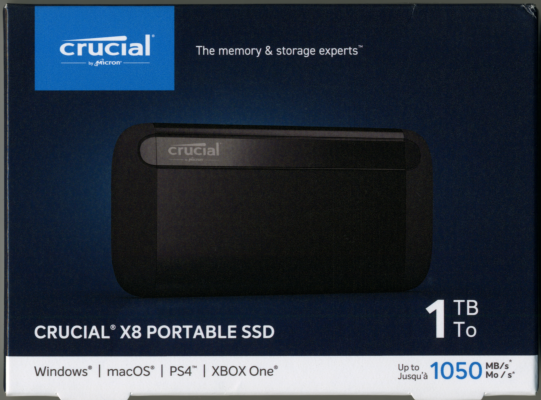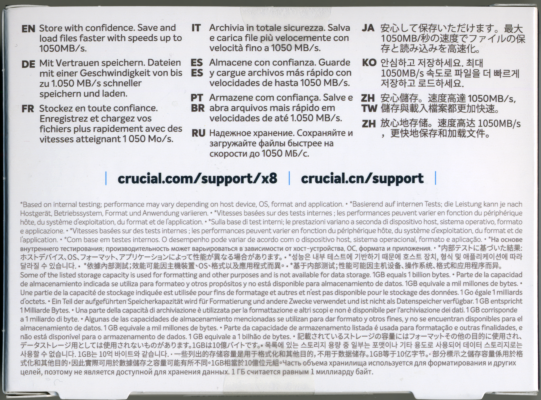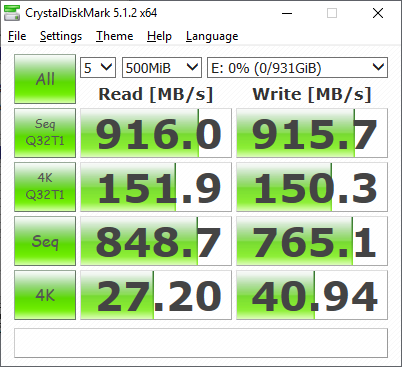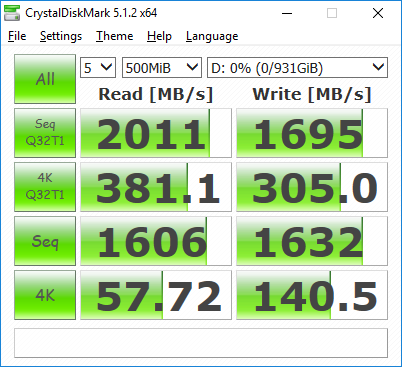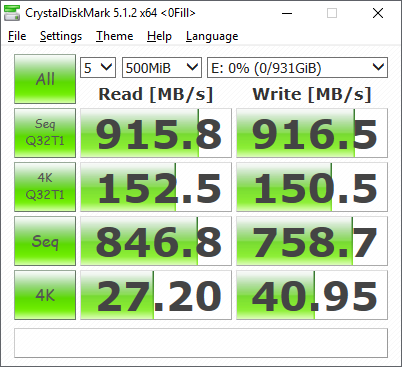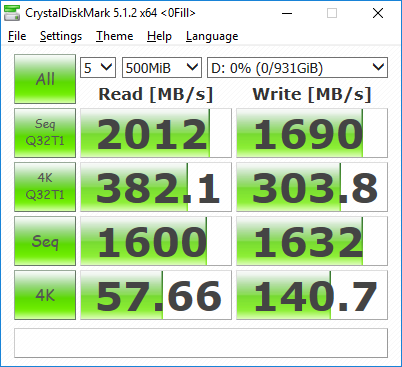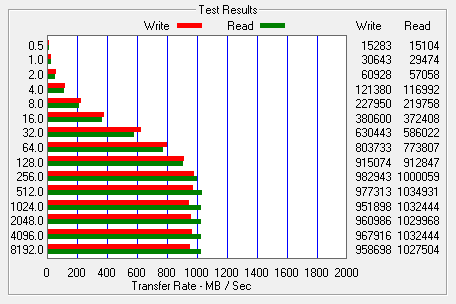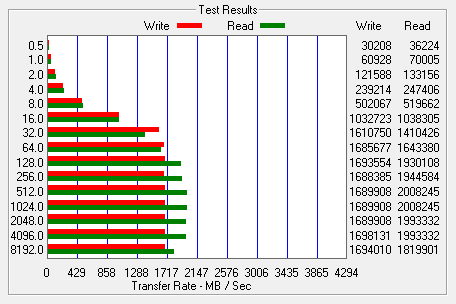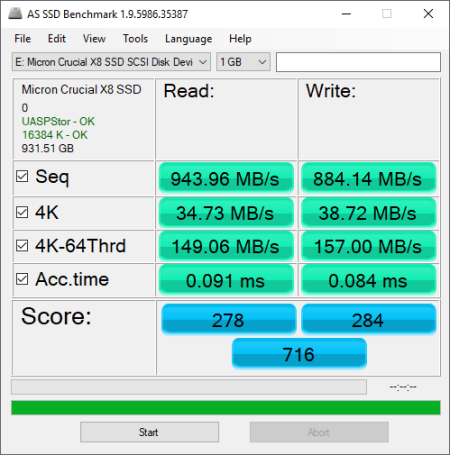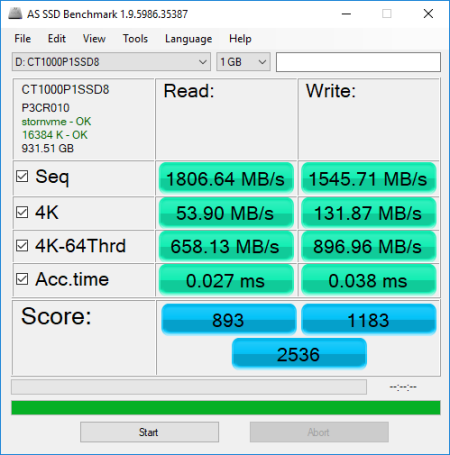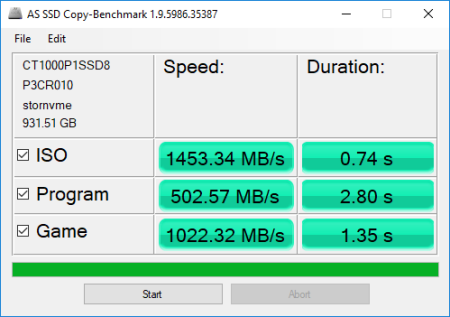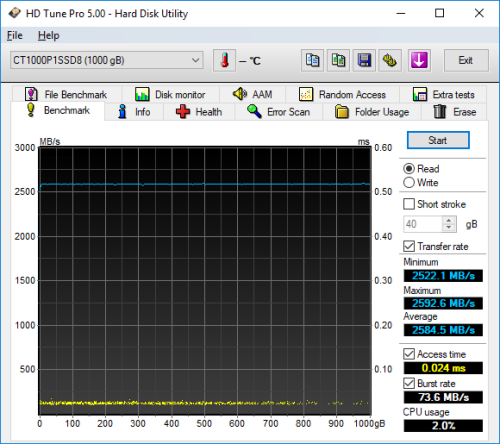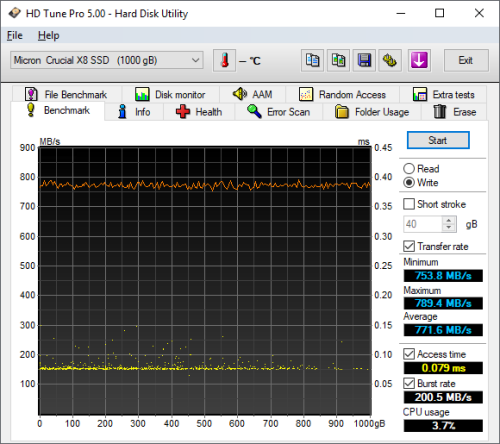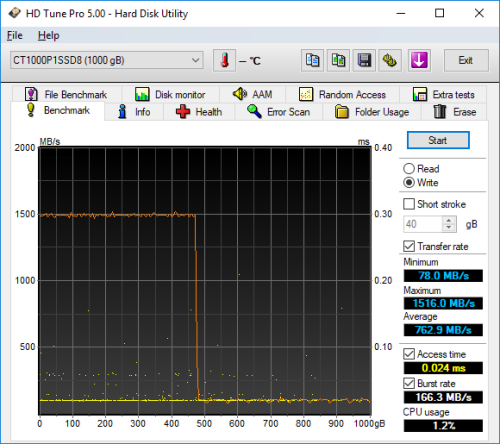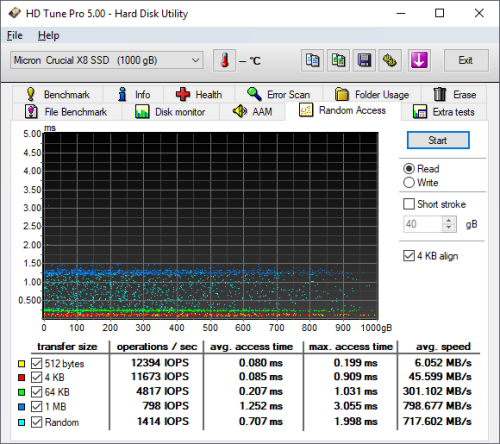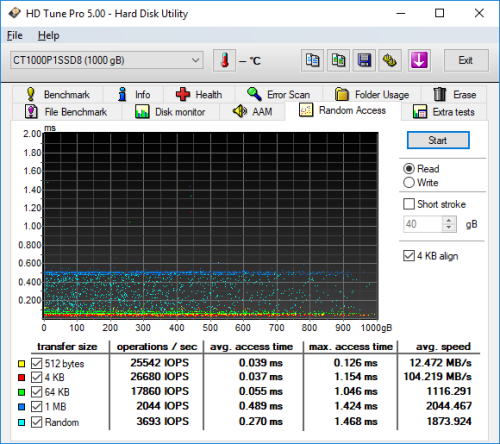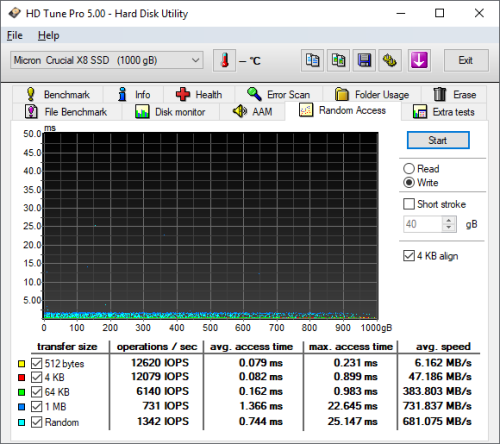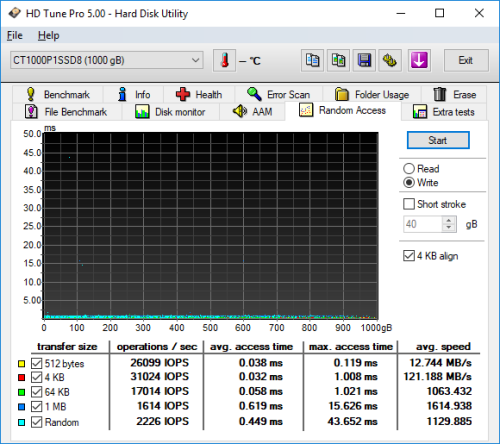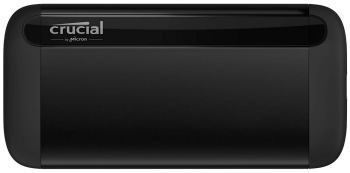

Model: Crucial X8 1TB Portable Solid State Drive
Manufacturer: Crucial
Provided By: Crucial
Crucial is a global brand of Micron Technology, Inc., one of the largest memory and flash storage manufacturers in the world. The company's product lineup includes award-winning solid state drives (SSDs) and computer memory upgrades (DRAM) for more than 50,000 systems. These products have been qualified and approved by major original equipment manufacturers and every single module has been rigorously tested at the component and module level. Each SSD also undergoes over a thousand hours of prerelease validation testing and hundreds of qualification tests to ensure optimal reliability and performance.
This past fall, Crucial launched its first portable SSD, the X8. Manufactured to be durable, rugged and compact, this lightweight, pocket-sized SSD is built with a unibody core of anodized aluminum and can withstand accidental drops of up to 7.5 feet. On the inside, the X8 is powered by Silicon Motion's SM2263EN controller and is available with up to 1TB of Micron's 3D QLC NAND flash. It is also equipped with a USB 3.2 Gen 2 interface which lets users save or load files up to 1.8x faster than most portable SSDs and 7.5x faster than portable hard drives. To top it all off, the X8 works with PCs, Macs, iPad Pros and Chromebooks as well as game consoles like the PS4 and Xbox.
The X8 is available in 500GB and 1TB capacities. For this review, Crucial sent us the 1TB version of the drive which is capable of delivering up to 1050 MB/s sequential read speeds.
| Crucial X8 1TB Portable Solid State Drive | |||||||||||||
General Specifications
Performance
Other Features
|
Needless to say, this is only a taste of what the X8 has to offer. To give you an idea of what to expect, we'll take a closer look at Crucial's first portable SSD and then see how well it performs. Does the X8 have what it takes? Can it deliver the performance and features that we've come to expect from Crucial? Keep reading as we find out.
The X8 comes in a small, blue and white box. While there aren't a lot of technical details, the packaging advertises some of the drive's key features including its 1TB capacity, 1050 MB/s transfer speed, and its support for Windows, macOS and game consoles like the PS4 and Xbox One. Inside the box, you'll find the X8, a Type-C USB cable, Type-C to USB-A adapter and a small, multilingual quick-start guide.
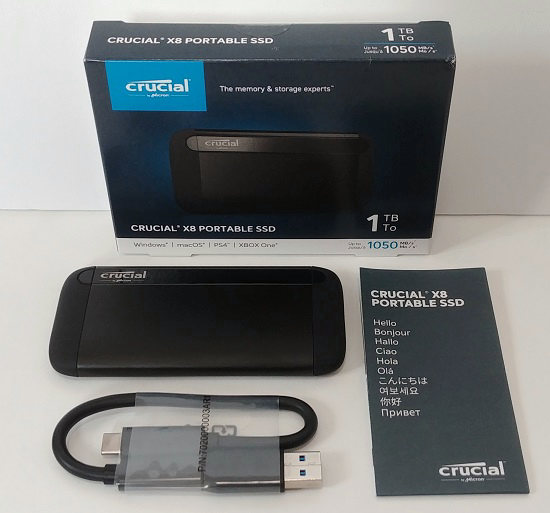
Physical Features:
The Crucial X8 is manufactured to be durable, rugged, and compact. The drive measures 110 x 53 x 11.5 mm and tips the scales at a mere 97 grams.
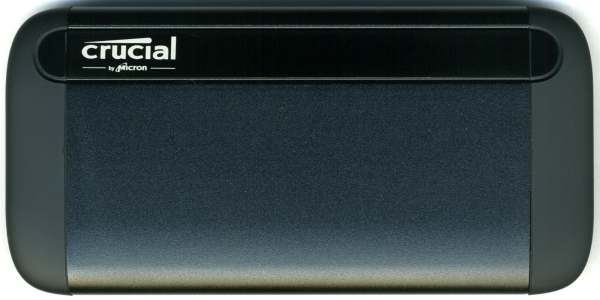
While the ends of the X8 are rubber, the body is made out of anodized aluminum. This not only looks and feels great, it dissipates heat efficiently to maximize performance. As a result, the X8 can get a bit warm to the touch during extended usage.
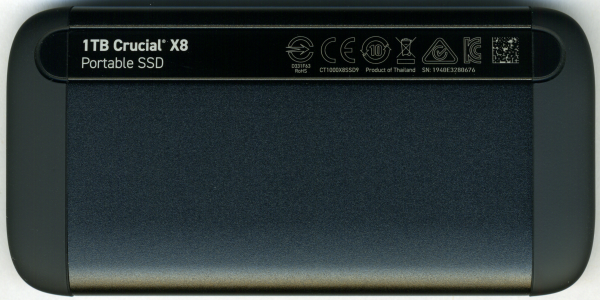
The X8's USB 3.2 Gen 2 Type-C port is located on the end of the drive. This interface transfers data and provides power for the device.

I wasn't able to crack the X8 open. However, if you were to do so, you'd find an M.2 PCIe SSD very similar to the Crucial P1. The drive inside the X8 is powered by Silicon Motion's SM2263EN controller and is equipped with Micron's QLC 64-layer 3D NAND flash.
The test system used in this review is equipped with an Intel Core i7-6700K CPU, GIGABYTE GA-Z170X-UD3 motherboard, 32GB (16GB x 2) of Crucial Ballistix Sport LT DDR4 memory, Samsung 960 PRO 512GB SSD and a GIGABYTE GeForce GTX 1060 WINDFORCE OC 6G graphics card. For the operating system, I installed a fresh copy of Windows 10 Enterprise.
To test the performance of Crucial's X8 SSD, I ran a series of benchmarks using CrystalDiskMark, HD Tach RW, ATTO Disk Benchmark, AS SSD, HD Tune Pro, Anvil's Storage Utilities, Iometer and PCMark 8. For comparison, I've also included test results from the ADATA's XPG SX6000 Pro, Western Digital WD Black SN750, Samsung 970 EVO Plus, ADATA XPG SX8200 Pro, Crucial P1, ADATA XPG SX8200, Western Digital WD Black NVMe, Samsung 970 EVO, Samsung 970 PRO, Plextor M9Pe, Plextor M8Se, Patriot Hellfire, ADATA XPG SX8000, Samsung 960 PRO, Toshiba OCZ RD400, Samsung 950 PRO, ADATA Ultimate SU750, SK hynix Gold S31, Samsung 860 QVO, Samsung 860 PRO, Crucial MX500, Plextor M8V, Samsung T5 and Crucial BX300.
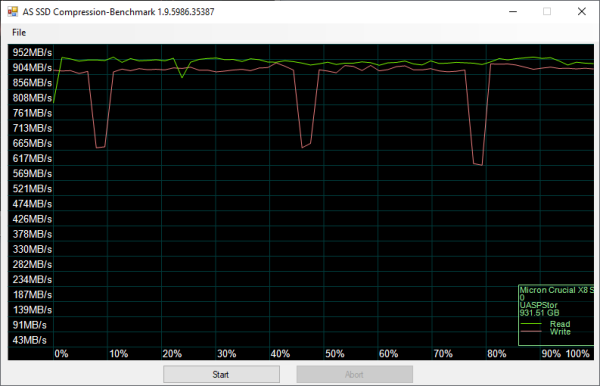
As I mentioned earlier, the X8 is based on Silicon Motion's SM2263EN controller chip. Looking at the screenshot above, you can see that it performs equally well with both incompressible (0%) and compressible (100%) data.
CrystalDiskMark 5.1.2:
First, I ran a few quick tests using CrystalDiskMark. This benchmark tool measures the performance of a storage device by testing its sequential read and write speeds as well as its random read and write speeds using blocks 512K and 4K in size.
According to Crucial, the 1TB version of the X8 is capable of reading at speeds up to 1,050 MB/s. While the drive performed fairly well, it came up a bit short of this number in CrystalDiskMark's sequential read speed test.
The X8 performed equally well when using highly compressible 0x00 (0 Fill) data. This time around, the drive was able to read at 915.8 MB/s and write at 916.5 MB/s.
HD Tach RW 3.0.4.0:
Next, I used HD Tach to test the Crucial X8's read, write and burst speeds as well as its seek times and CPU usage.
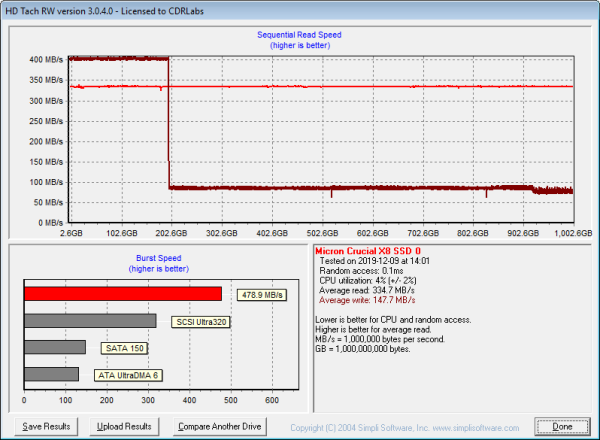
Looking at the screenshot above, you can see that the X8 had average read and write speeds of 334.7 MB/s and 147.7 MB/s respectively, as well as a burst speed of 478.9 MB/s. The screenshot also shows that it uses some sort of SLC caching. The drive starts writing at about 400 MB/s and then drops to about 90 MB/s when the write operation exceeds the size of the cache.
ATTO Disk Benchmark 2.46:
I also used ATTO Disk Benchmark to test the Crucial X8's sequential read and write speeds. The tests are run using blocks ranging in size from 0.5KB to 8192KB and the total length set to 256MB.
When tested with ATTO, the Crucial X8's read speeds topped out at about 1,034 MB/s and its write speeds at 982 MB/s.
AS SSD:
AS SSD is a relatively new benchmark designed specifically for solid state drives. The application contains five synthetic tests used to determine the sequential and random read and write performance of a drive.
AS SSD also includes a copy benchmark. This test copies an ISO (two large files), program (many small files) and game (small and large files), returning the speed and duration of each.
HD Tune Pro 5.00:
Next, I ran a series of tests using HD Tune Pro. This hard disk utility measures a drive's performance by testing its sequential read and write speeds as well as its access time, burst rate and CPU usage. For this review, I'm also going to use it to benchmark the Crucial X8's random read and write speeds, random access times and the number of operations per second.
The X8 performed relatively well when benchmarked with HD Tune. The drive had average read and write speeds of 795.2 MB/s and 771.6 MB/s, respectively, and a burst rate of 239.5 MB/s when reading.
When reading 4KB blocks, the X8 reached 11,673 IOPS and had an average speed of 45.599 MB/s. The drive was a bit faster when writing, reaching 12,079 IOPS with an average speed of 47.186 MB/s.
Anvil's Storage Utilities:
Anvil's Storage Utilities is another benchmark designed with SSDs in mind. The standard storage benchmark measures a drive's performance by testing its transfer speeds, access times and IOPS.
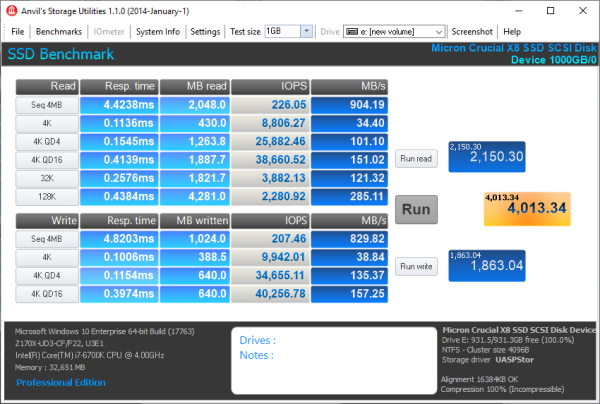
Iometer:
Lastly, I ran a series of tests using Iometer. This tool can be configured to benchmark a number of things. In this case, I used it to measure the X8's read and write speeds and the number of operations per second. The tests were run using random bytes and a queue depth of 3.
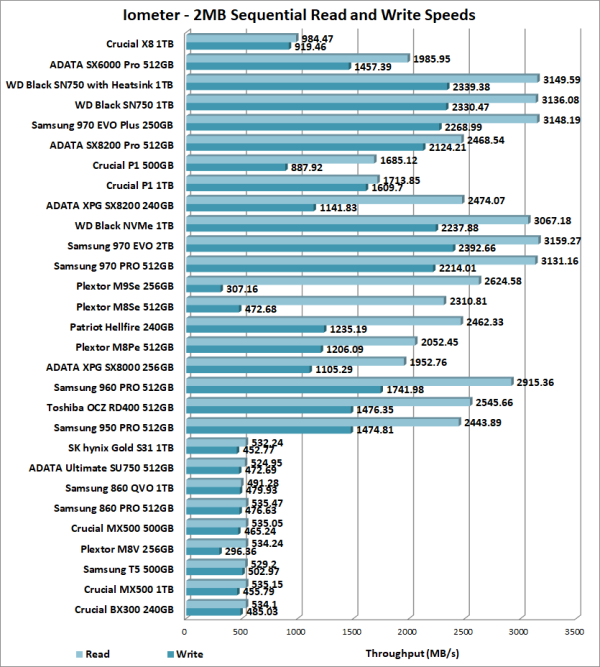
The X8's performance was very similar to what we saw in our other tests. The drive was able to read at 984.47 MB/s and write at 919.46 MB/s.
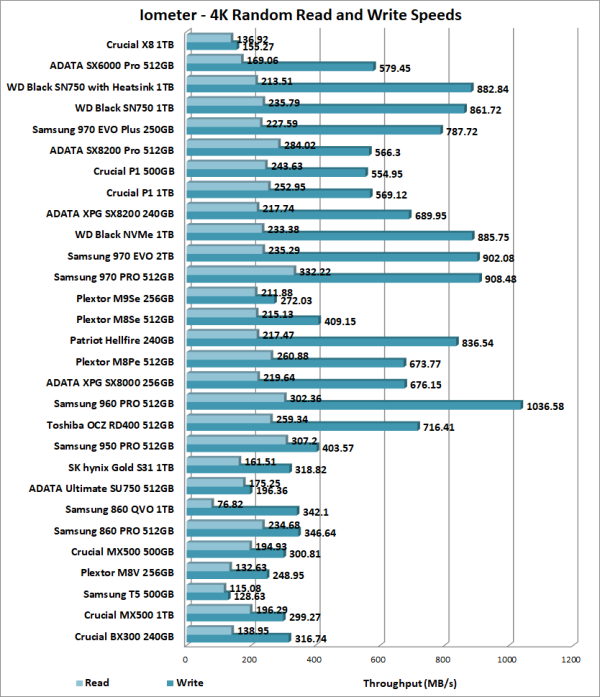
The X8 wasn't one of the faster drives we've tested when it came to random reads and writes. In our tests, the drive was able to read at 136.92 MB/s and write at 155.27 MB/s.
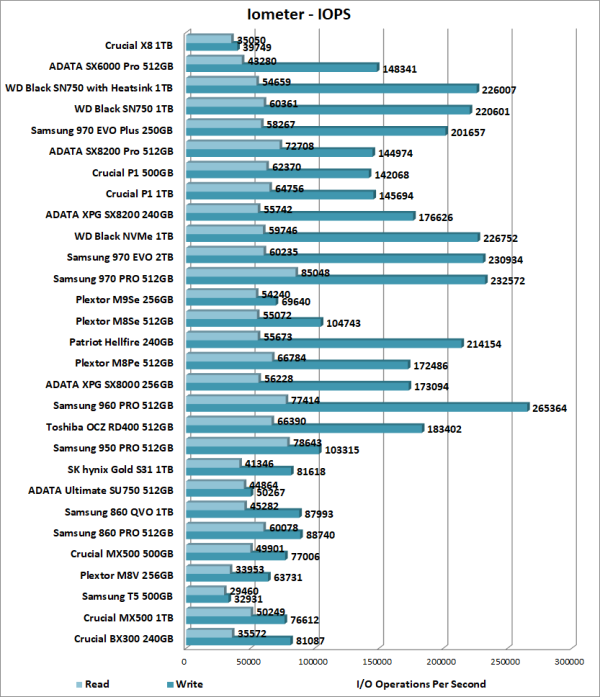
Crucial really doesn't say what the X8 is capable of in regards to IOPS. In our tests, the drive reached 35,050 random read IOPS and 39,749 random write IOPS. Increasing the queue depth had little impact on the X8's random write performance. However, with the queue depth set to 32, the drive was able to reach 38,431 random read IOPS.
PCMark 8 - Storage Test:
PCMark 8 is a complete benchmark for Windows. It includes five benchmark tests, each designed around a specific scenario. The storage benchmark measures drive performance using real-world traces recorded from Adobe Creative Suite, Microsoft Office and a selection of popular games.
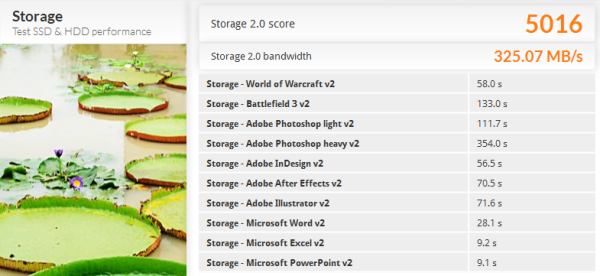
PCMark 8 also includes a consistency test which measures the performance consistency and degradation tendency of a storage system. The test reports the performance level at the start, the degraded steady-state and the recovered state as well as the number of iterations required to reach the degraded state and the recovered state. For this test, we are focusing on the Adobe Photoshop (Heavy) trace and will look at both the bandwidth and latency of the drive
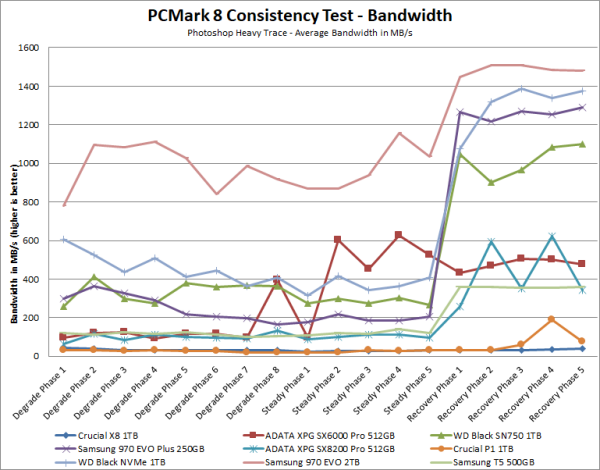
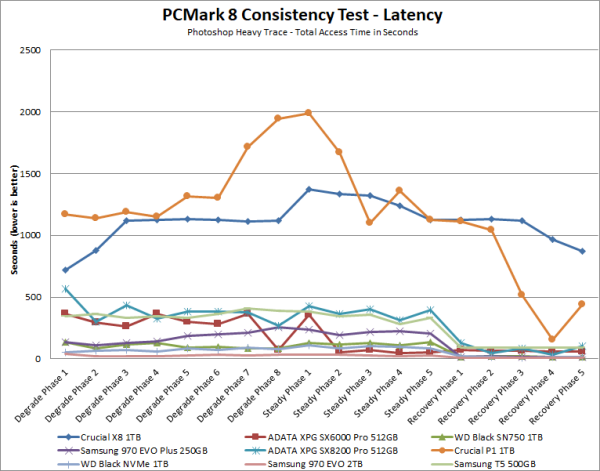
Like the P1, the X8 didn't do as well as the other SSDs in this test. Its bandwidth dropped below 25 MB/s during the steady phase, pushing its latency above the 1,300ms mark. The X8 never really recovered either, topping out at a mere 38 MB/s.
TRIM Performance:
While SSD's offer many benefits, there are some downsides to using flash memory. One of the biggest issues people run into is performance degradation. Over time, an SSD will run out of fresh blocks and will have to write over data the file system has marked as deleted. This procedure is very complicated and can slow an SSD's write speeds considerably.
To fix this problem, most manufacturers have added TRIM support to their SSDs. The TRIM command allows an operating system, such as Windows 7, to tell an SSD which data blocks are no longer in use. Using this information, the drive pro-actively erases these blocks and adds them to the free block pool.

To test the X8's TRIM and garbage collection functions, I first put the drive in a "dirty" state. I used Iometer to fill 80% of the drive and then ran a random write test for 30 minutes. This had little impact on the X8's read speed. However, its average writing speed dropped to 83.20 MB/s.
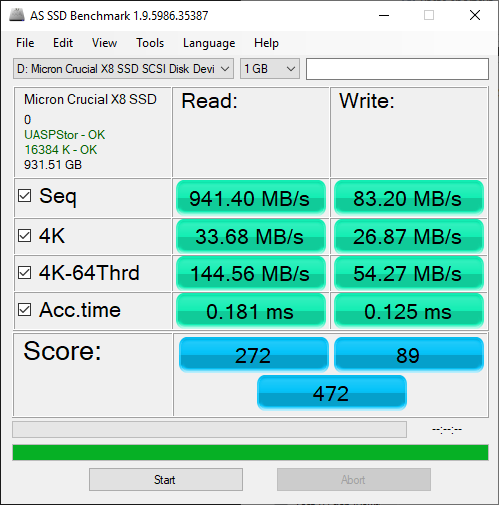
Crucial X8 - Dirty
To see how well the X8 could recover, I let the computer sit for about 30 minutes and then reran the test. The drive wasn't able to reach the factory fresh performance shown in our earlier tests. However, its sequential write speed jumped up to 877.12 MB/s.
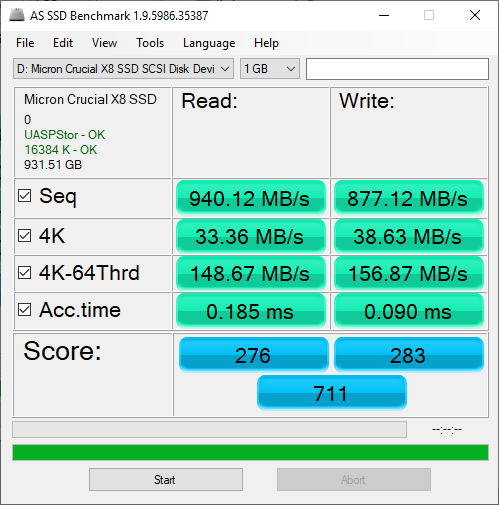
Crucial X8 - After TRIM
Unfortunately, the X8 does not support the secure erase function so I was not able to wipe the drive with Parted Magic. Instead, I did a quick wipe and format from within Windows. After this, the X8 was able to read at 947.39 MB/s and write at 882.17 MB/s.
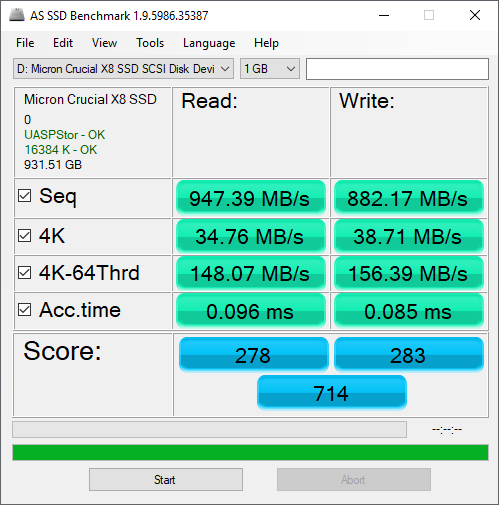
Crucial X8 - Secure Erased
Final Thoughts:
Crucial's X8 portable SSD is a great addition to the company's already impressive line of flash-based storage products. Built with a unibody core of anodized aluminum, this lightweight, pocket-sized drive not only looks great, but is rugged enough for everyday use. The X8 is also powered by the same Silicon Motion SM2263EN controller found in Crucial's award winning P1 SSD and is available with up 1TB of Micron's 3D QLC NAND flash. Combine this with a USB 3.2 Gen 2 interface and you have a portable SSD that's capable of some pretty impressive performance. In our sequential read and write tests, the X8 was able to read at speeds as high as 1,034 MB/s and write at speeds in excess of 915 MB/s.
The Crucial X8 is available now in 500GB and 1TB capacities and can be purchased from Amazon.com for $100 and $165, respectively.

Highs:
- Available in 500GB and 1TB capacities
- Durable, rugged, and compact design
- Silicon Motion SM2263EN controller
- Equipped with Micron 3D QLC NAND
- USB 3.2 Gen 2 interface
- Excellent sequential read and write speeds
- Works with Windows, Mac, iPad Pro, Chromebook, Android, Linux, PS4 and Xbox
- Reasonably priced
- 3 year warranty
Lows:
- Mediocre random read and write performance
- Case gets a little warm to the touch during extended usage
- Does not support hardware based encryption
